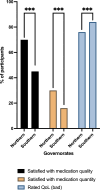War and chronic illness: a health center-based study of Palestinians with non-communicable diseases in Gaza
- PMID: 40556013
- PMCID: PMC12186419
- DOI: 10.1186/s13031-025-00679-9
War and chronic illness: a health center-based study of Palestinians with non-communicable diseases in Gaza
Abstract
Background: The war in the Gaza Strip has put immense strain on the infrastructure and health services. As a consequence, the population faces increased risks of morbidity and mortality, not only from violence but also from lack of access to healthcare. This study examines how the war affected Palestinians with non-communicable diseases (NCDs) in the Strip.
Methods: This cross-sectional survey employed a structured questionnaire to recruit 968 patients with six common NCDs from seven leading PHC clinics located in northern and southern Gaza between October and November 2024. The survey collected sociodemographic data, assessed direct war impacts on participants, evaluated accessibility to PHC and medications, and examined health impacts on participants during the war. Following descriptive statistics, inferential analysis investigated the relationships between participants' perceptions of PHC and their areas of residence or displacement.
Results: Hypertension (64.9%), type II diabetes mellitus (44.4%), and cardiovascular disease (17.1%) were the most frequently reported NCDs. 98.0% of participants were displaced during the war, and 68.1% were still displaced. 29.9% had lost a first-degree relative, and the majority suffered inaccessibility to adequate food and drinking water, lost property and income, and suffered adverse impacts on their sleep and physical exercise habits. 92.8% rated their pre-war quality of life (QoL) as excellent or good, while 81.3% rated their QoL during the war as poor. Adherence to regular follow-ups decreased from 96.7% before the war to 40.7% during the war (p < 0.001). Satisfaction with PHC dropped from 92.9% to 57.33% (p = 0.002). In terms of access to PHC, more than 93% changed their PHC doctor or clinic, and most stated that reaching the clinic was dangerous and necessitated long journeys. Medication unavailability or high cost were the most frequently reported reasons for non-compliance during the war, reported by 42.7% and 18.1%, respectively. Nearly one in five participants spent two or more consecutive months without medication. Participants from the southern enclave were significantly less satisfied with PHC and medications (p = 0.001), and their subjective QoL was significantly worse (p = 0.007).
Conclusions: The study offers important insights into the impacts of high-intensity armed conflicts on people with NCDs. The war in the Gaza Strip has profoundly impacted patients with NCDs and hampered their access to healthcare, leaving the population at risk for higher morbidity and excess mortality rates now and well into the future.
Keywords: Access to primary care; Armed conflict; Gaza Strip; Humanitarian crises; Low-income countries; Non-communicable diseases.
© 2025. The Author(s).
Conflict of interest statement
Declarations. Ethics approval and consent to participate: Ethical approval for this study was obtained from the Institutional Review Board (IRB) at the Islamic University of Gaza. Participants provided informed written consent. Confidentiality of the data was maintained throughout data collection and analysis. Consent for publication: Not applicable. Competing interests: The authors declare no competing interests.
Figures
Similar articles
-
Quality of life and access to healthcare among hemodialysis patients during wartime: cross-sectional insights from Gaza.BMC Nephrol. 2025 Jul 9;26(1):367. doi: 10.1186/s12882-025-04322-w. BMC Nephrol. 2025. PMID: 40634837 Free PMC article.
-
Home treatment for mental health problems: a systematic review.Health Technol Assess. 2001;5(15):1-139. doi: 10.3310/hta5150. Health Technol Assess. 2001. PMID: 11532236
-
Targeted mass media interventions promoting healthy behaviours to reduce risk of non-communicable diseases in adult, ethnic minorities.Cochrane Database Syst Rev. 2017 Feb 17;2(2):CD011683. doi: 10.1002/14651858.CD011683.pub2. Cochrane Database Syst Rev. 2017. PMID: 28211056 Free PMC article.
-
End-stage kidney disease patients during the current Gaza war: challenges and outcomes of care.BMC Nephrol. 2025 Jul 1;26(1):339. doi: 10.1186/s12882-025-04256-3. BMC Nephrol. 2025. PMID: 40597881 Free PMC article.
-
Systemic pharmacological treatments for chronic plaque psoriasis: a network meta-analysis.Cochrane Database Syst Rev. 2021 Apr 19;4(4):CD011535. doi: 10.1002/14651858.CD011535.pub4. Cochrane Database Syst Rev. 2021. Update in: Cochrane Database Syst Rev. 2022 May 23;5:CD011535. doi: 10.1002/14651858.CD011535.pub5. PMID: 33871055 Free PMC article. Updated.
Cited by
-
Quality of life and access to healthcare among hemodialysis patients during wartime: cross-sectional insights from Gaza.BMC Nephrol. 2025 Jul 9;26(1):367. doi: 10.1186/s12882-025-04322-w. BMC Nephrol. 2025. PMID: 40634837 Free PMC article.
References
-
- Albelbeisi AH, Albelbeisi A, El Bilbeisi AH, Taleb M, Takian A, Akbari-Sari A. Barriers of adherence among palestinian healthcare professionals towards the protocol of health education and counselling on healthy behaviours for non-communicable diseases. Ethiop J Health Sci. 2021;31(1):73–84. - PMC - PubMed
-
- Mosleh M, Aljeesh Y, Dalal K. Burden of chronic diseases in the Palestinian healthcare sector using disability-adjusted life years (DALY), Palestine. Divers Equal Health Care. 2016;13(3):261–8.
-
- Mosleh M. Non-communicable diseases and war injuries in Palestine: burden, incidence and management in the health system: Mid Sweden University; 2020.
-
- MoH P. Health Annual Report 2022. 2023 June 2023.
LinkOut - more resources
Full Text Sources
Research Materials



